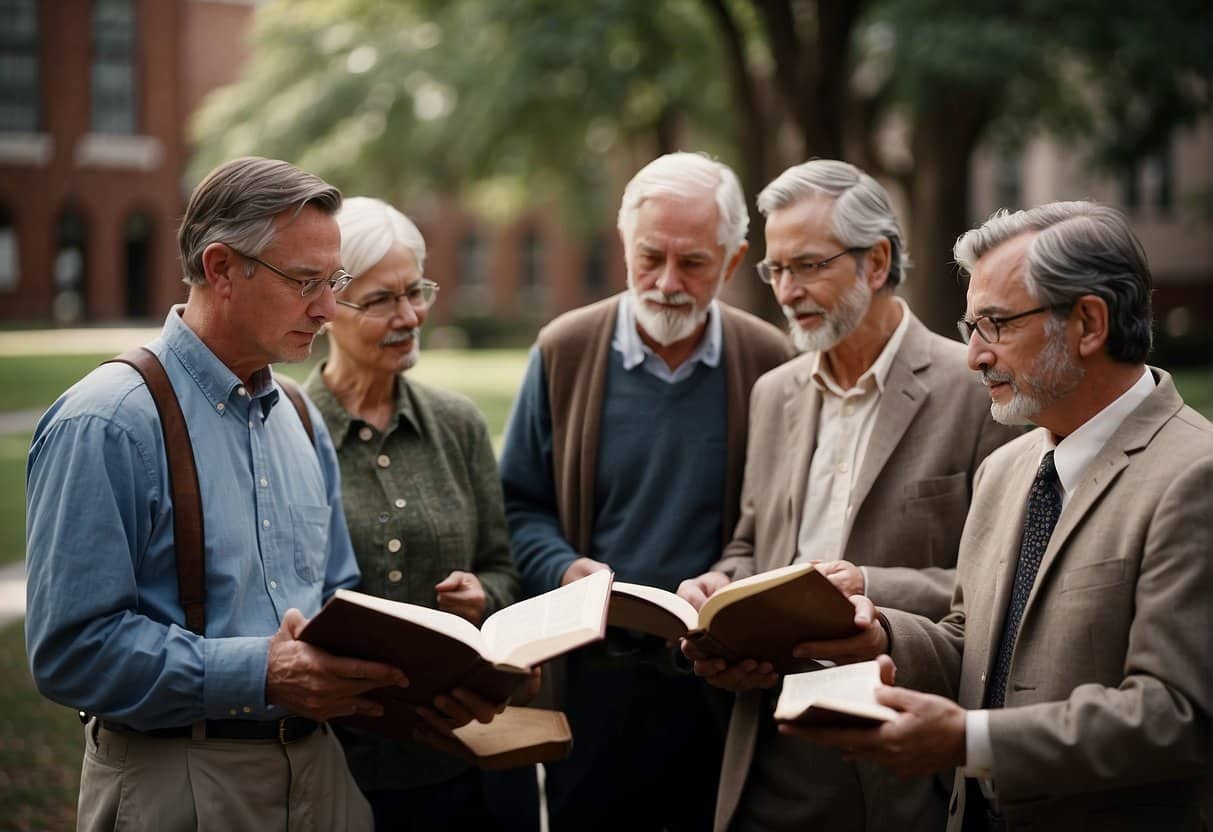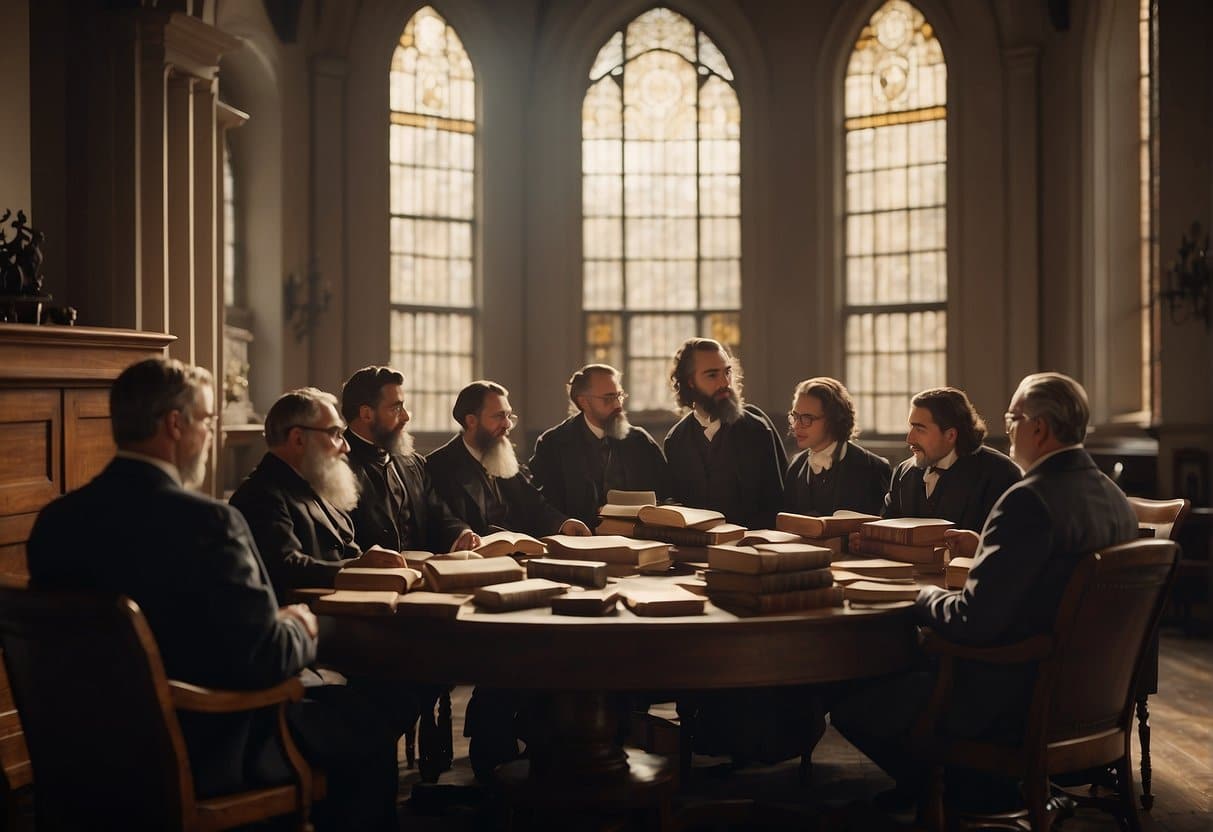If you’re curious about the Presbyterian Church’s stance on saints, you’re not alone.
Many people wonder whether Presbyterians believe in saints and how they view their role in the church.
The answer is not that specific, as it varies depending on the interpretation of scripture and tradition within the Presbyterian denomination.

Presbyterians believe in the priesthood of all believers, which means that all Christians have direct access to God through faith in Jesus Christ.
This emphasis on the individual’s relationship with God may lead some Presbyterians to view saints as unnecessary intermediaries between God and humanity.
Nevertheless, this does not mean that Presbyterians reject the idea of saints altogether.
Some Presbyterians may consider saints as exemplary models of faith and devotion, while others may view them as historical figures who inspire us to live a life of faith.
The Presbyterian Church has a rich history and tradition that shapes its beliefs and practices.
As such, its views on saints are influenced by its interpretation of scripture and the teachings of its founders. To better understand the Presbyterian Church’s stance on saints, it’s important to explore its history, beliefs, and practices.
Presbyterian Beliefs in Saints and Theology
Presbyterians are a part of the Reformed tradition and hold to the authority of Scripture, the sovereignty of God, and the necessity of grace through faith in Christ.
In this section, we will discuss some of the key beliefs and doctrines of Presbyterianism.
Authority of Scripture
Presbyterians believe that the Bible is the inspired and authoritative Word of God.
The Westminster Confession of Faith, which is a statement of Presbyterian theology, states that “the whole counsel of God, concerning all things necessary for his glory, man’s salvation, faith, and life, is either expressly set down in Scripture, or by good and necessary consequence may be deduced from Scripture.”
Sovereignty of God
Presbyterians believe in the sovereignty of God, which means that God is in control of all things. This includes everything from the smallest details of our lives to the course of human history.
The Westminster Confession of Faith states that “God from all eternity did, by the most wise and holy counsel of His own will, freely and unchangeably ordain whatsoever comes to pass.”
Covenant and Election
Presbyterians believe in the covenantal relationship between God and His people. This covenant is based on God’s grace and is not dependent on our merit or works. In addition, Presbyterians believe in the doctrine of election, which states that God has chosen those whom He will save.
This is not based on any foreseen merit or faith on the part of the individual but is solely based on God’s sovereign choice.
History of Presbyterianism and Saints

Presbyterianism is a branch of Protestant Christianity that originated in Scotland during the 16th century.
It is named after the Presbyterian form of church government, in which churches are governed by representative assemblies of elders.
John Calvin and Reformation
Presbyterianism is heavily influenced by the teachings of John Calvin, a French theologian who played a key role in the Protestant Reformation.
Calvin’s teachings emphasized the sovereignty of God, predestination, and the authority of the Bible.
These ideas were central to the development of Presbyterianism, which places a strong emphasis on the authority of Scripture and the sovereignty of God.
Presbyterianism in Scotland and America
Presbyterianism was first established in Scotland during the 16th century, and it quickly spread to other parts of Europe and eventually to America. In Scotland, the Presbyterian Church was established by John Knox, a disciple of Calvin.
The Presbyterian Church in America was established much later, in 1973, as a result of a merger between two Presbyterian denominations.
Presbyterianism has played a significant role in the development of American Christianity, particularly in the areas of education and social justice.
Many of the early American colleges and universities were founded by Presbyterians, and the denomination has been active in promoting civil rights and other social causes.
Church Structure and Governance

Presbyterians follow a unique system of church governance known as Presbyterian polity.
This system emphasizes community and democracy and is different from other forms of church governance. In this section, we will discuss the different aspects of Presbyterian polity and how it affects the church structure and governance.
Elders and Ministers
Local congregations of churches that use Presbyterian polity are governed by sessions made up of representatives of the congregation, known as elders.
Elders are elected by the congregation and serve as spiritual leaders and decision-makers. Ministers are also considered elders, but they are ordained and have additional responsibilities such as preaching and administering sacraments.
Presbytery and Synod
Presbyteries are regional governing bodies that oversee a group of churches in a specific geographic area. They are made up of ministers and elders from each church in the presbytery.
Synods are similar to presbyteries, but they oversee a larger geographic area and are made up of representatives from each presbytery in the synod.
Congregational Participation
Presbyterian polity emphasizes the importance of congregational participation in decision-making.
This means that all members of the congregation have a say in the direction of the church and are encouraged to participate in the decision-making process.
This democratic approach is reflected in all levels of decision-making, from the session to the general assembly.
Sacraments and Worship Practices
Presbyterians have a strong emphasis on worship and the sacraments. The two sacraments recognized by Presbyterians are baptism and the Lord’s Supper.
Both of these sacraments are viewed as signs and seals of God’s covenant of grace.
Baptism and Lord’s Supper
Baptism is a sacrament that signifies the washing away of sin and the new birth in Christ.
Presbyterians practice infant baptism, which is seen as a sign of God’s grace and covenant faithfulness to the child. Baptism is also viewed as a sign of membership in the church.
The Lord’s Supper, also known as Communion, is a sacrament that involves the sharing of bread and cups in remembrance of Jesus’ sacrifice on the cross.
Presbyterians believe that the bread and cup are symbols of Christ’s body and blood and that the sacrament is a means of grace for believers.
Worship and Liturgy
Worship is characterized by a focus on the Word of God and the sacraments. Worship services typically include prayer, hymns, Scripture readings, and a sermon.
The liturgy of the service may vary depending on the particular congregation, but the focus is always on the glory of God and the edification of the congregation.
Presbyterians value the use of the Psalms in worship, and many congregations incorporate them into their services.
The use of liturgy and formal prayers is also common in Presbyterian worship, and many congregations use a Book of Common Worship to guide their services.
Presbyterian Perspective on Saints
Presbyterians do not typically believe in the veneration or intercession of saints as practiced in some other Christian denominations.
The Presbyterian perspective on saints is based on the belief that all Christians are saints and that the term “saint” refers to all who have been saved by grace through faith in Jesus Christ.
Veneration and Intercession
Presbyterians do not believe in the veneration or worship of saints. Instead, they believe that God alone is worthy of worship and that prayers should be directed to him alone.
They do not ask the saints to intercede on their behalf, but instead believe that Jesus Christ is the only mediator between God and humanity.
Mary and the Apostles
While they acknowledge the important role that Mary and the apostles played in the history of Christianity, they do not believe that they have any special power or authority to intercede on behalf of believers.
Communion of Saints and the Afterlife
Presbyterians believe in the communion of saints, which refers to the fellowship of all believers in Christ, both on earth and in heaven.
They believe that all who have been saved by grace through faith are part of this communion of saints.
They also believe in the resurrection of the dead and the afterlife, and that believers will be reunited with their loved ones who have died in Christ.
